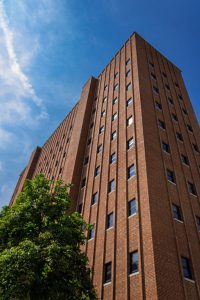Student fees to be discussed at meeting
April 4, 1991
After jabbing back and forth in public, Student Association officials and NIU administrators will meet today and try to settle their differences about who controls student activity fees.
The meeting of the advisory committee to Vice President for Student Affairs Barbara Henley will be the fifth of a dragged-out process that has lasted nearly five months.
Since the last meeting on Jan. 31, SA officials have brought their case to the public by showing their frustration over what they said has been interference by NIU President John La Tourette.
The conflicts started when La Tourette stopped a letter from the committee to the Board of Regents, the governing body of NIU, which asked the Regents to interpret current activity fee bylaws.
La Tourette said he stopped the letter because the committee already had received a clear response in a previous letter sent in December.
“All the questions raised on this campus were communicated” to the Regents and their responses were complete, La Tourette stated in a memo to Henley.
The first response from the Board was clear in stating that “full and final oversight and authority (over student activity fees) exist at all times” for Henley, La Tourette said.
However, SA officials charge that the administration’s authority is not that clear-cut.
“To me, there are 50 ways to skin a cat,” said SA Welfare Adviser Curt Stein, who just was admitted to the committee. “The administration is saying that there is only one way to skin the cat.”
SA President Robert McCormack also has made public a report from the 1968 University Council, a body of faculty and students, that says the SA senate has nearly full control over student fees.
But La Tourette said the statements in the documents are illegal.
“Given state law, one could never, as president, accept those conditions,” La Tourette said.
Complaints about the slowness of the process have come from both La Tourette and McCormack. But McCormack said La Tourette’s interference and the chain of command that letters have to go through are part of the problem.
“I would like to get this cleared out of the way as quickly as possible,” McCormack said. “It has been dragging on too long, and I don’t think it has been the students’ fault.”
Committee chairman Gary Gresholdt said some progress has been made, but no recommendations have been given to Henley.
Gresholdt also said he does not think the public controversy will prevent the committee from doing its job.






